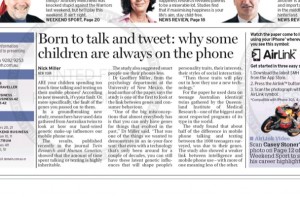Born to talk and tweet

A contact from a previous story got in touch to let me know about some new research of his, on the connection between our genes and our mobile phone use.
It ran in a rather truncated form in the Sydney Morning Herald on May 19, 2012.
Online here.
Or read the extended version after the jump…
By Nick Miller
New York
ARE your kids spending too much time talking and texting on their mobile phones?
According to new research, it’s your fault. Or more specifically, the fault of the genes you passed on to them.
In a groundbreaking new study, researchers have used data gathered from Australian twins to look at how our hard-wired genetic make-up influences our mobile phone use.
The results, published recently in the journal Twin Research and Human Genetics, showed that the amount of time spent talking or texting is highly heritable.
The study also suggested that smart people use their phones less.
Dr Geoffrey Miller, from the psychology department at the University of New Mexico, the lead author of the paper, says the study is one of the first to look at the link between our genes and our consumer behaviour.
But he predicts that it won’t be the last – and that canny marketers may one day analyse our very DNA to try to influence our buying decisions.
“One of the big misconceptions that almost everybody has is that you can only have genes for things that evolved in the past,” Dr Miller said. “That was one of the things we wanted to demonstrate in an in-your-face way: that even with a technology that’s only been around for a couple of decades, you can still have these latent genetic influences that will shape people’s personality traits, their interests, their styles of social interaction.
“Then those traits will play out in how they use a new technology.”
For the paper he used data on teenage Australian identical twins gathered by the Queensland Institute of Medical Research – one of the biggest and most respected programs of its type in the world.
Scientists use mathematical techniques to compare identical twins, who have identical genetic make-up, with fraternal twins, who don’t, and come up with a simple figure that represents how ‘heritable’ a particular trait is.
The study found that about half of the difference between teenagers in mobile phone talking and texting was due to their genes.
However the other half was not their family environment, their neighbourhood, or their social class – it seemed to be more or less random.
The study also showed a weaker link between intelligence and mobile phone use – with more of one meaning less of the other.
“It’s almost certainly driven by the genetics of intelligence playing out in mobile phone use,” Dr Miller said. “One way to interpret that is that bright people are just less interested in gossip. The other is that brighter people communicate faster and more effectively using fewer words and making fewer errors.”
The study was met with scepticism from consumer research experts, who rejected the paper for publication in their journals.


